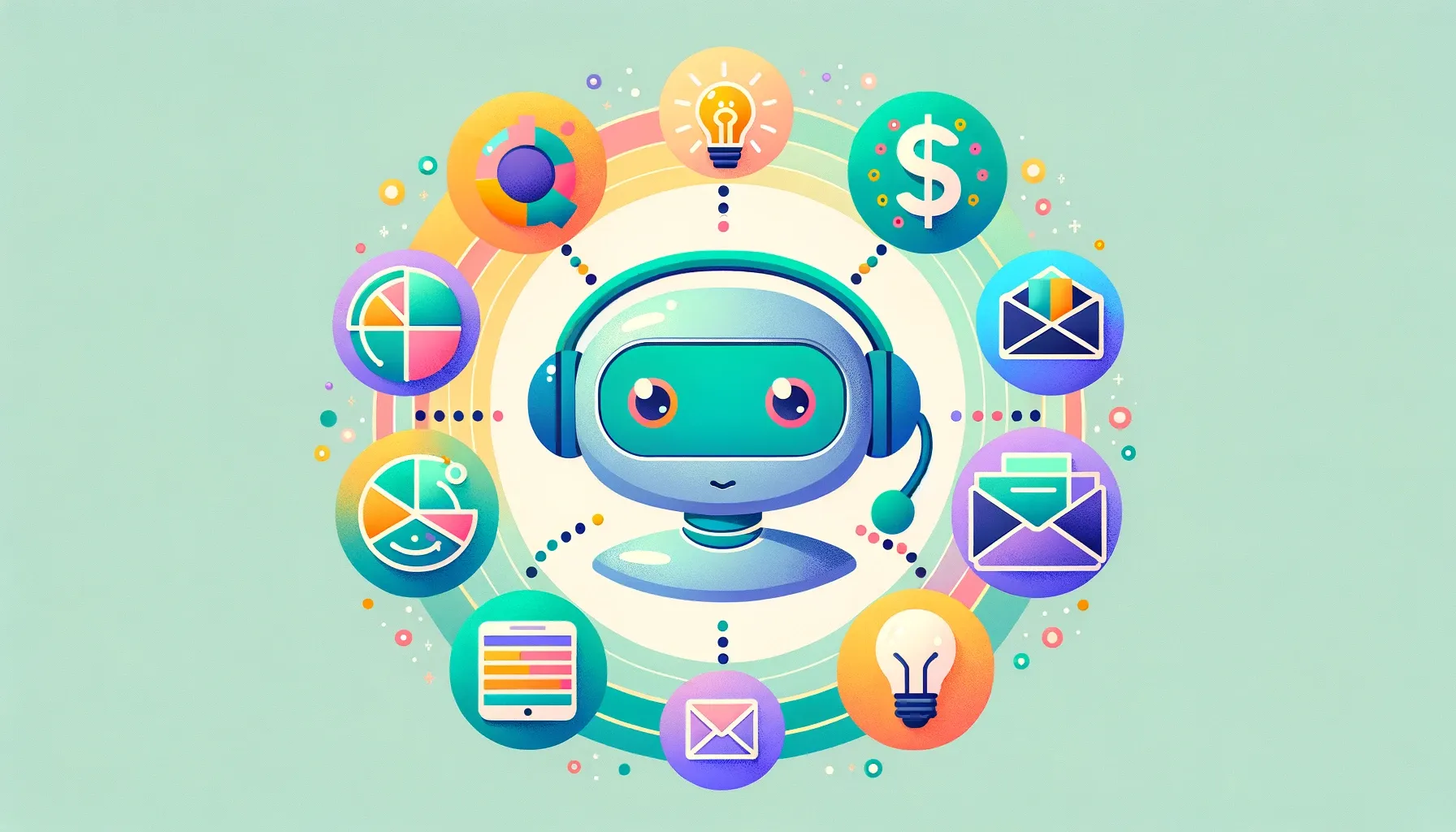Today we want to touch base on how to leverage AI chatbots for better customer engagement.
In today's fast-paced digital world, businesses are constantly seeking innovative ways to connect with their customers and provide exceptional experiences.
One powerful tool that has emerged in recent years is AI chatbots. These intelligent virtual assistants have revolutionized customer engagement by leveraging customer data, enhancing real-time communication and support, maximizing sales opportunities, and building customer loyalty through hyper-personalized experiences.
With the rise of AI language models like ChatGPT, Claude, and recently also Bard, it opens up a whole new world and evolution for AI chatbots.
In this blog, we will explore the various ways in which AI chatbots can transform your customer engagement strategies and help you stay ahead in today's competitive market.
So, if you are ready to discover the power of AI chatbots in customer engagement let’s dive right into it!
Understanding the Power of AI Chatbots in Customer Engagement
In today's digital age, businesses are constantly seeking ways to enhance their customer engagement and improve the overall customer experience.
These chatbots have become a priority for businesses in expanding their customer experience, thanks to the recent advancements in AI technology.
Chatbots often serve as the first point of contact for customers when they interact with a business. They provide a friendly and convenient experience, greeting customers and engaging with them in a personalized manner. There are two main types of chatbots: rule and condition-based and AI chatbots.
Rule-based chatbots are easy to set up and provide a high level of customer service. They respond to customer queries with predetermined answers, ensuring quick and accurate responses. On the other hand, AI chatbots utilize natural language processing or machine learning techniques to understand customer requests and improve with each interaction.
Let’s take a look at a rule based chatbot to give some more clarity on what we mean;
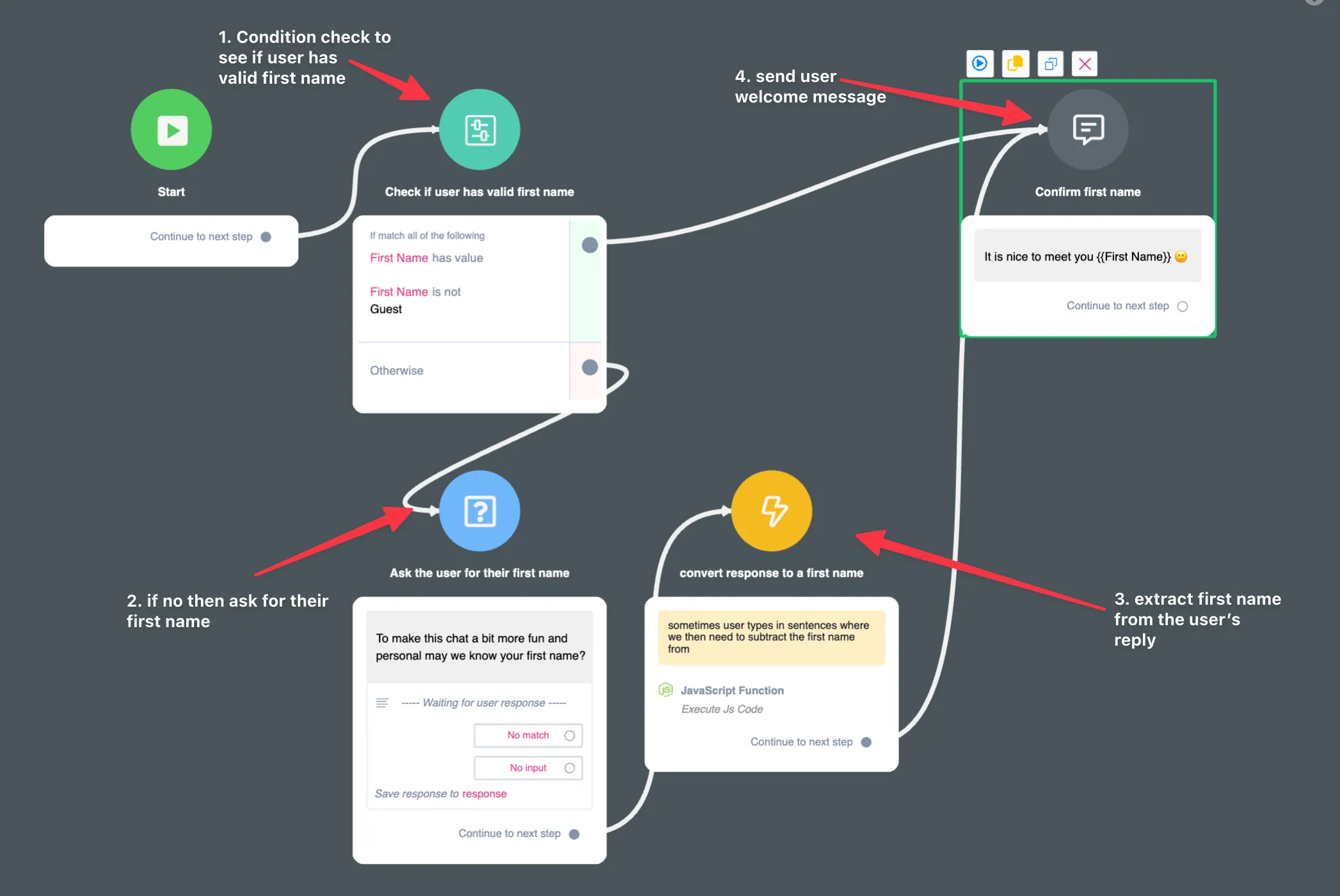
As you can see above there are quite a few rules and conditions before a user is able to be welcomed with a simple message. It starts with a condition check to see if the first name has any valid value. If not we go to the next step which is to ask for the user’s name.
Now since people often type more than just their name like “Hey sure it’s Mark” we first need to extract the name from the sentence as otherwise the chatbot would respond with “It is nice to meet you Hey sure it’s Mark”
So in this case we use a javascript with preset code to extract the name and then save it to the system field as such.
Now for an AI-based chatbot, it can be much done much easier with basically 1 node. Inside of UChat, this is called a chat completion and with it, you can use ChatGPT to provide a more conversational approach for the end user;
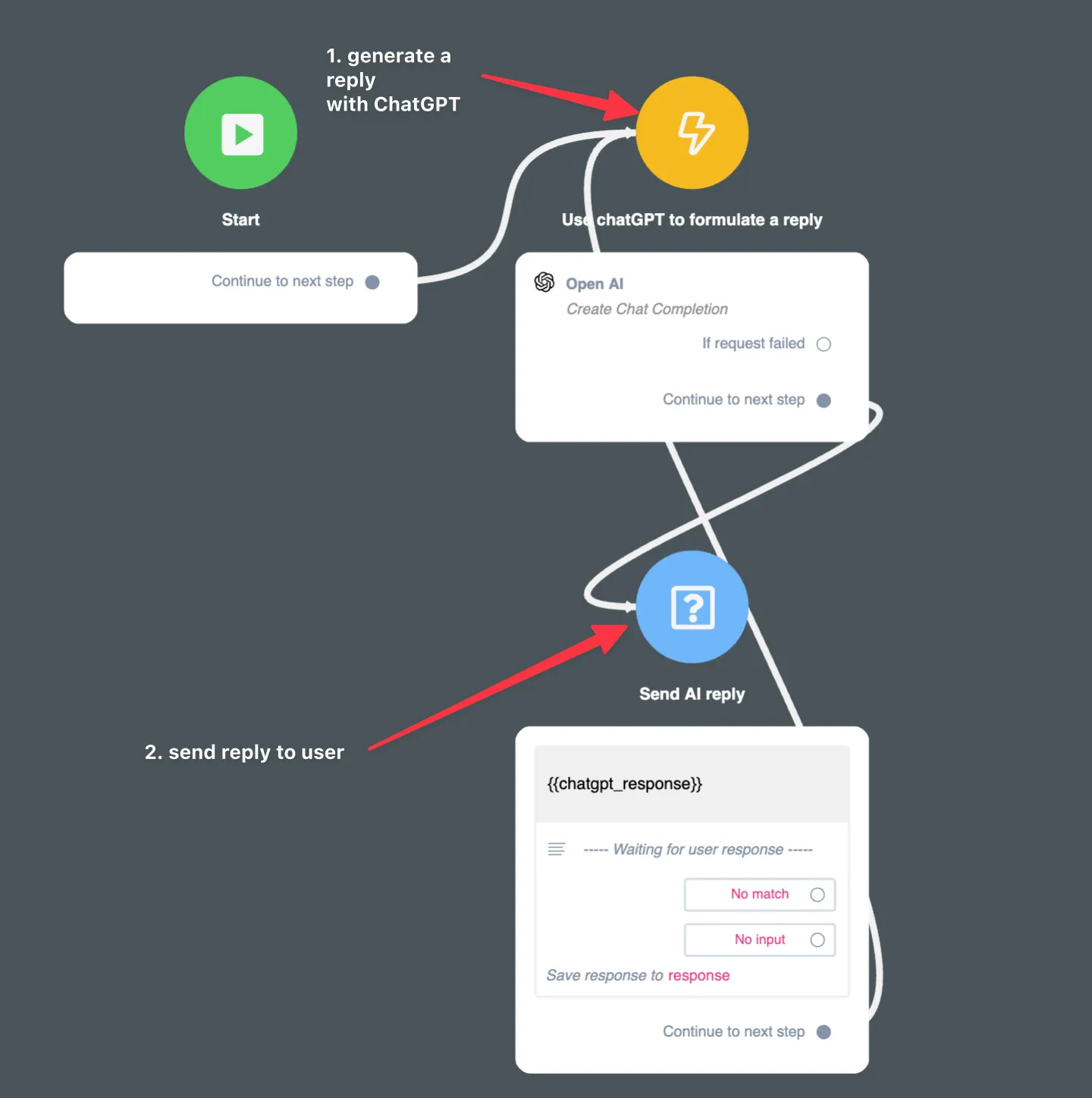
As you can see the previous steps 1 through 3 have been replaced with just one single node. Inside you will notice why this is possible;
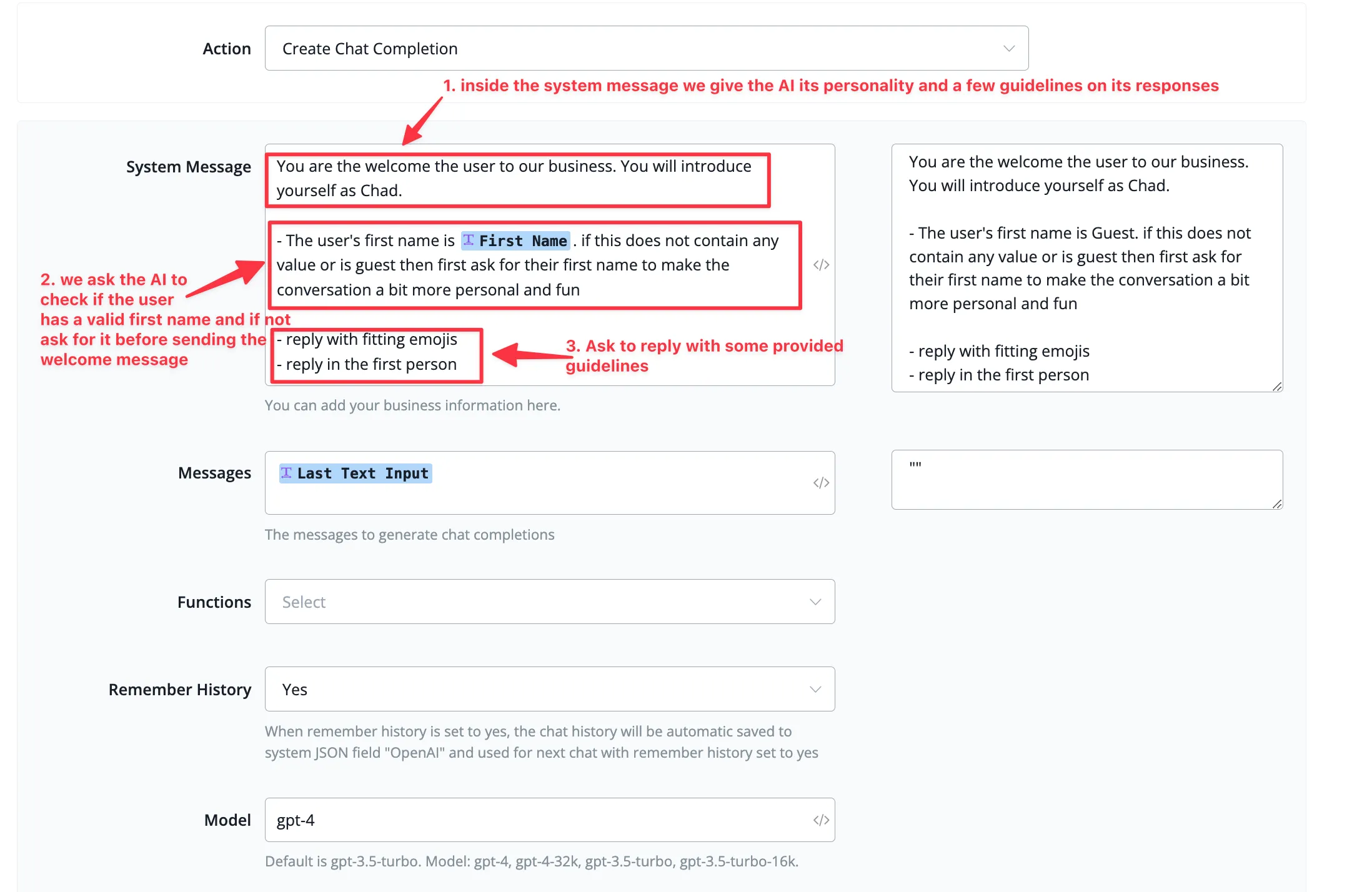
You can see a lot is being handled directly inside the system message and this is all being used when calling ChatGPT to formulate a reply. On the right side you can see sample data and if you process that we can test it directly to see in which style ChatGPT will reply with;
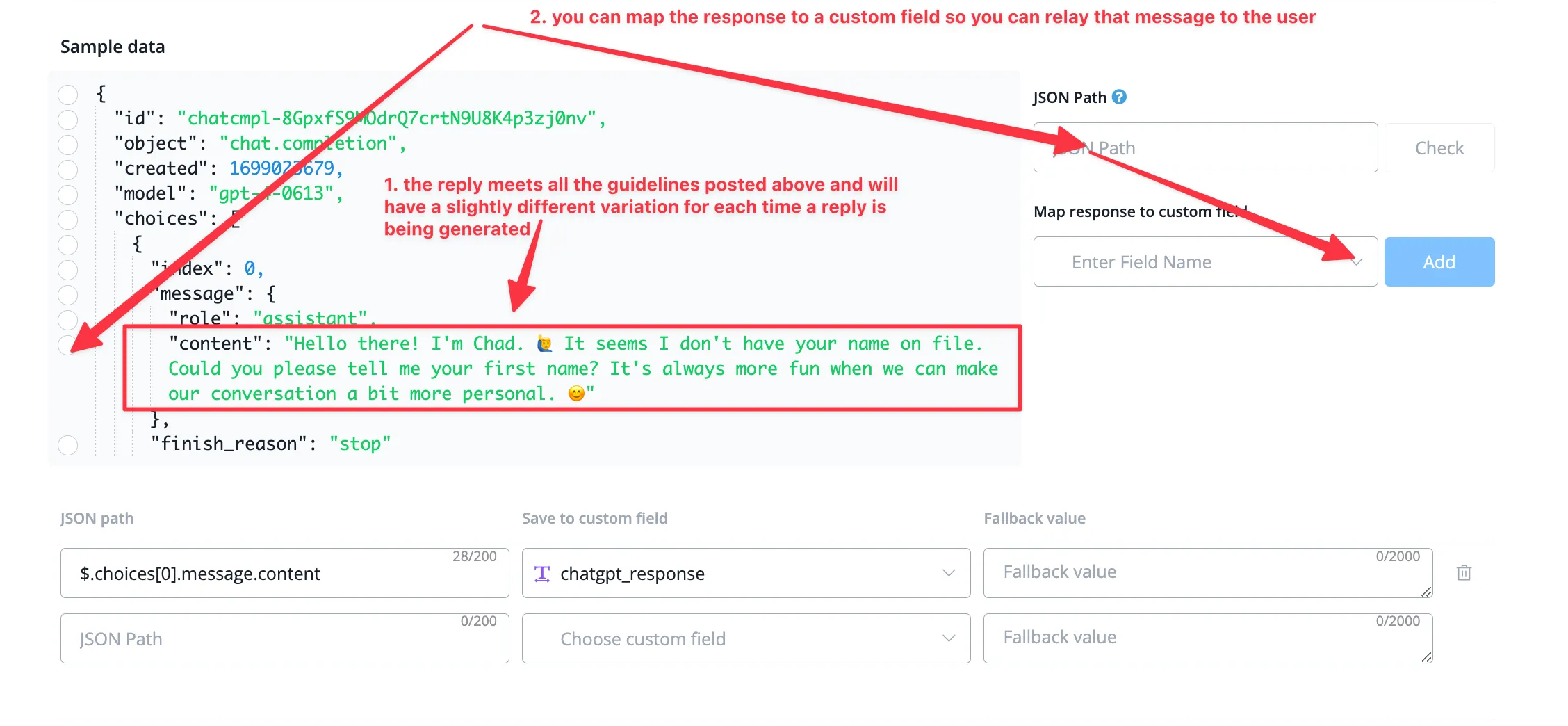
Very easy to map, use, and send to the user in the next node. You can loop this around as you saw in the image above which is fantastic as you could have an entire conversation with the user using just these two nodes!
These AI chatbots have become the industry standard due to their ability to provide more intelligent and personalized responses across different sections of a user’s journey through your business communication. Whether that is going through a sales funnel, engaging with quizzes, entering a loyalty program, or customer support.
One of the key benefits of chatbots for customers is the provision of fast and 24/7 customer service and other automated business processes.
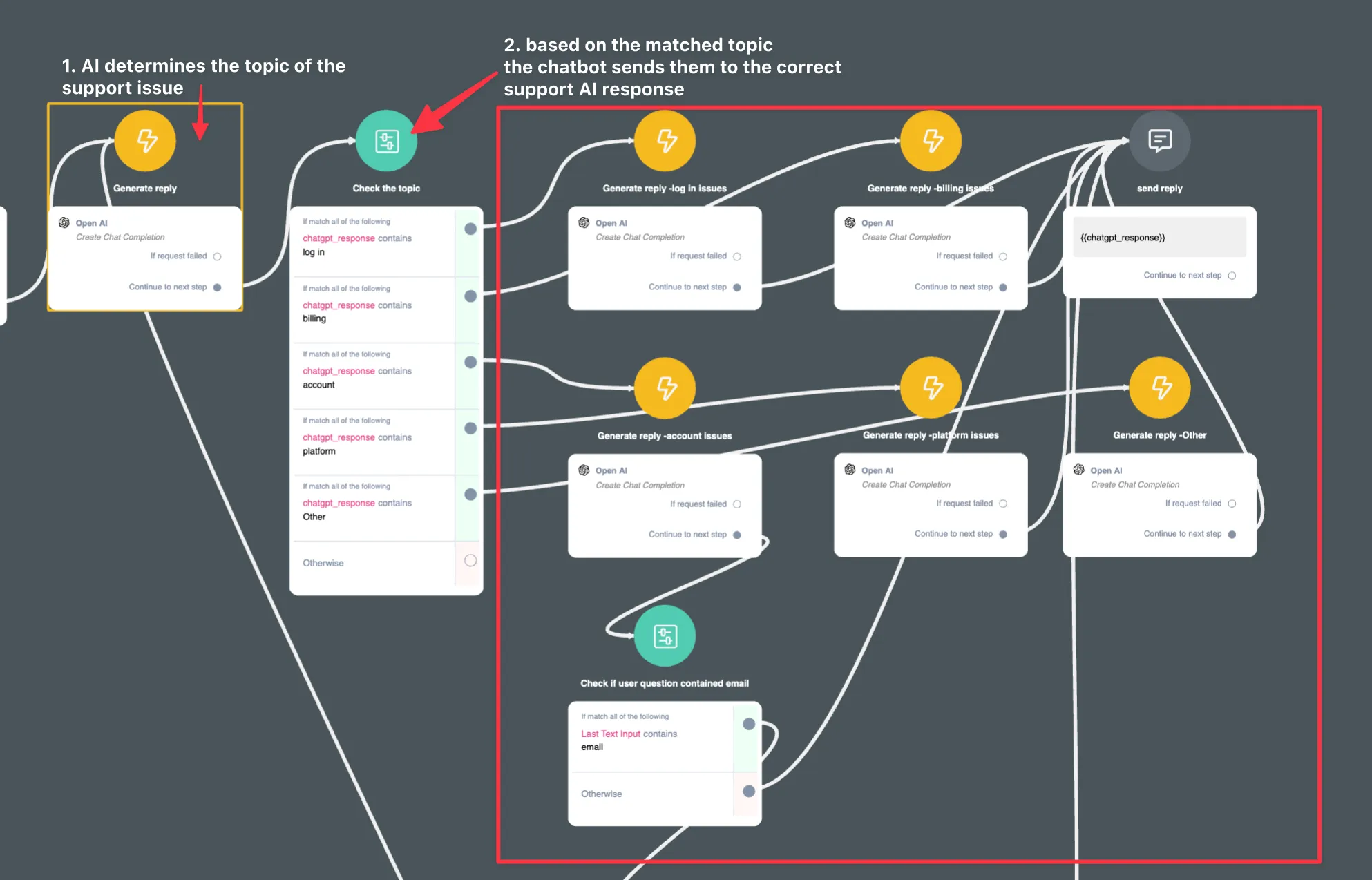
Here you can see that the AI will first determine which topic the user’s support question is related to and from there the chatbot will initiate the correct support response.
Customers expect quick and easy support, even during peak hours. Chatbots eliminate wait times by providing instant support, and since they never sleep, they can offer support at any time, even when human agents are offline.
This round-the-clock availability ensures that customers receive assistance at their convenience.
Moreover, chatbots can offer personalized recommendations and suggestions based on customer preferences and previous interactions. By analyzing customer data and insights into their behavior, pain points, and preferences, chatbots can tailor their responses and provide relevant product recommendations.
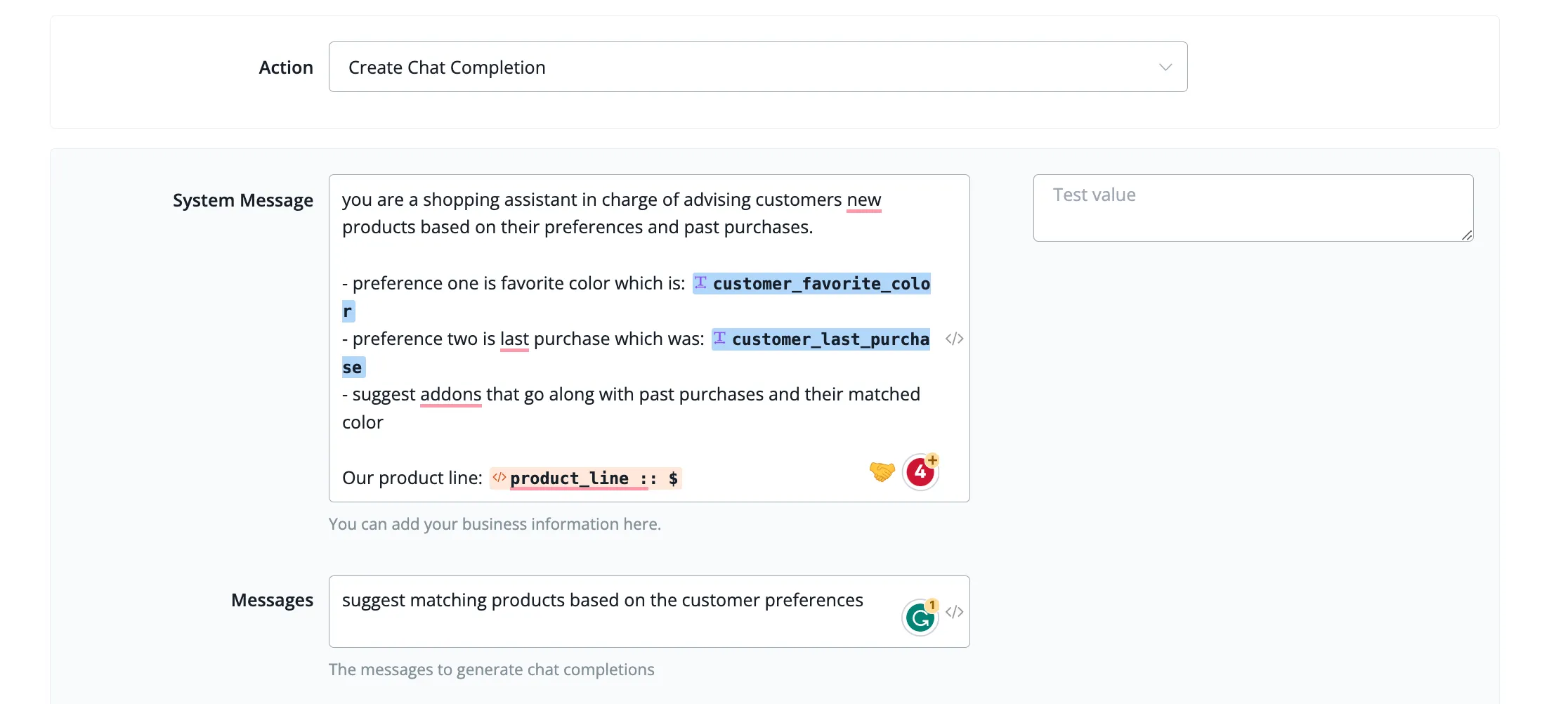
If we take a look at this example you will see that we stored some customer data like favorite color and any last purchase made. Based on that we will also send an entire product line along where the AI will make a selection of suggestions for the products the customer might be interested in.
This level of personalization enhances the customer experience and increases the likelihood of upselling or cross-selling.
Additionally, chatbots are capable of handling repetitive and mundane tasks, freeing up human employees to focus on more complex and strategic tasks. By automating these routine tasks, businesses can improve efficiency and productivity while ensuring that customer queries are addressed in a timely manner.
By providing fast and personalized customer service, chatbots contribute to improved customer satisfaction and first resolution time. This ultimately leads to a better overall customer experience and fosters customer loyalty and long-term commitment.
Leveraging Customer Data for Personalized Chatbot Interactions
Customer experience (CX) has become a critical factor in driving brand loyalty.
According to the Zendesk Customer Experience Trends Report 2021, 50% of customers surveyed said CX was more important to them now than it was a year ago. In fact, 75% of respondents stated that they would spend more money to buy from businesses that offer a good customer experience. Being able to communicate, shop, and receive support all in one channel rather than moving around between chat to webshop and back has become much more important.
To provide superior and enjoyable customer experiences, companies need to leverage data and personalization.
However, it is surprising to learn that less than half of support agents have access to any kind of data that could help them better assist customers. This means that many companies are missing out on the opportunity to use data personalization effectively.
Chatbots, powered by AI technologies like ChatGPT, can provide real-time communication and personalized responses to customer queries.
They can also offer tailor-made product recommendations, upselling opportunities, and relevant upgrades or add-ons based on the customer's interaction history.
By using data personalization effectively, businesses can build brand loyalty and enhance customer experiences.
Clear objectives should be set for customer conversations, ensuring a high response rate and meaningful interactions. Hyper-personalization can be achieved by leveraging AI-powered chatbot platforms like what we have shown you so far with UChat, which provides 24/7 availability and personalized support.
And UChat makes it super simple as well with no need for any coding knowledge which is a big plus when choosing your chatbot platform. It will save you time and money as these kinds of chatbots can be set up quickly and with minimum effort!
Enhancing Customer Experiences with Real-time Communication and Support
In today's fast-paced business world, meeting the expectations of customers who demand quick and efficient service is crucial. Real-time customer service, also known as live customer support, is a powerful tool that enables businesses to interact with customers in real time, providing instant assistance and increasing customer satisfaction.
Inside of UChat, you can provide this level of support on 15+ channels and still counting which is insane
By implementing real-time customer service, businesses can build stronger and more loyal relationships with their customers. Customers who receive immediate assistance and have their issues resolved quickly are more likely to remain loyal to a brand.
This not only reduces customer churn but also increases customer retention.
Remember this image from earlier?
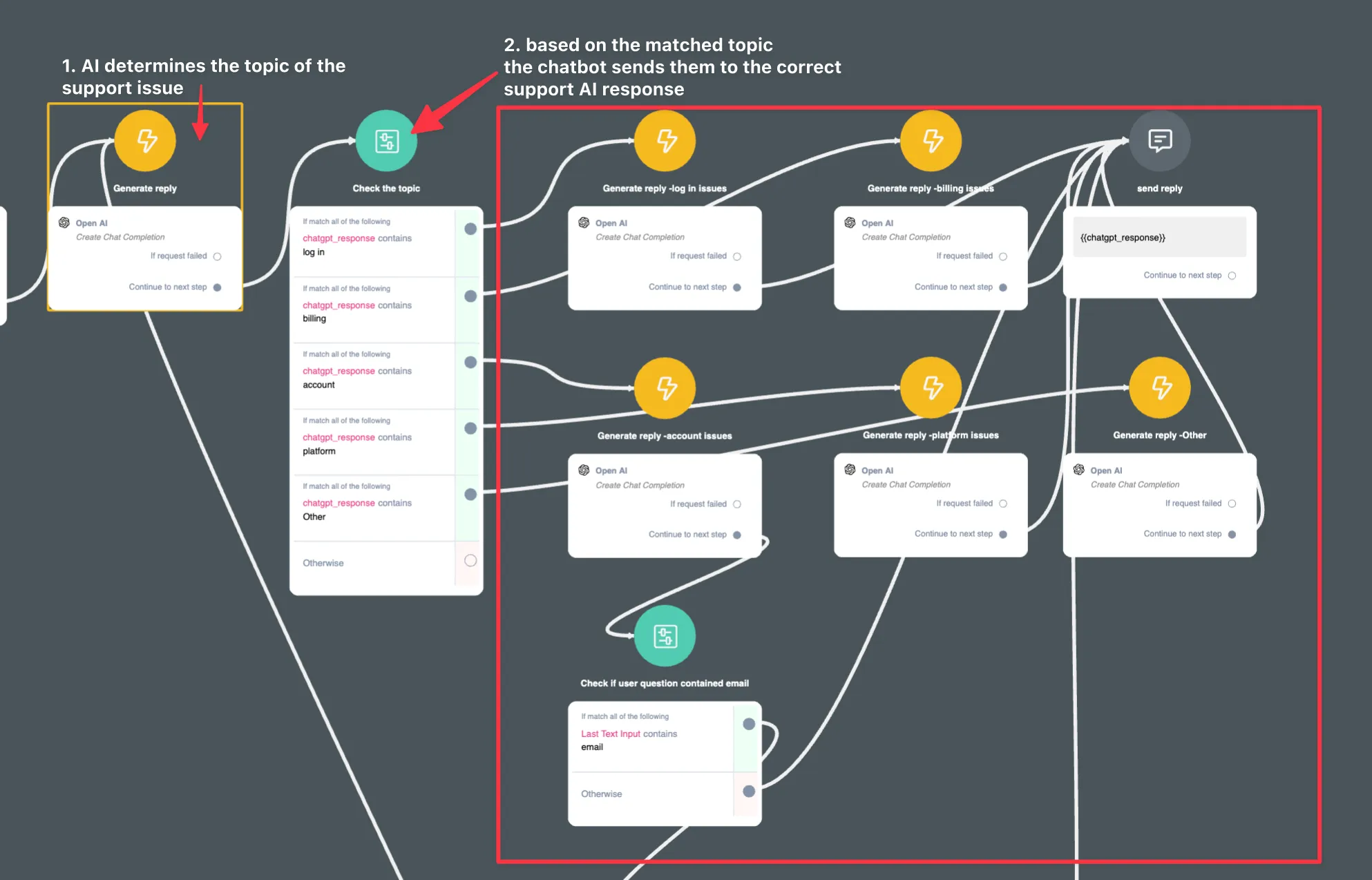
This kind of flow can address up to 80% of all customer support questions in a very conversational and personal manner!
Additionally, real-time customer service allows businesses to address customer complaints and issues in a timely manner.
By resolving small problems before they escalate, businesses can prevent negative experiences and further customer dissatisfaction. This proactive approach can significantly impact customer loyalty and long-term commitment.
One of the major benefits of real-time customer service is the ability to gather valuable customer feedback in real-time. By engaging with customers during their interactions, businesses can gain insights into their preferences, pain points, and overall satisfaction.
This feedback can then be used to improve products, services, and the overall customer experience.
Implementing real-time customer service can also help businesses save cost and time. With real-time communication channels such as chatbots, businesses can eliminate the need for customers to wait on hold for hours or for email responses.
This not only improves efficiency but also reduces customer frustration.
Maximizing Sales Opportunities with AI Chatbots: Upselling and Product Recommendations
AI chatbots have revolutionized the way businesses can maximize sales opportunities, particularly in the eCommerce industry. Taking inspiration from Amazon's success, businesses are increasingly turning to AI chatbots to implement effective upselling and cross-selling strategies.
Upselling involves upgrading a customer's product, offering them a better item for a slightly higher price. On the other hand, cross-selling focuses on encouraging customers to purchase related products or products that typically go together.
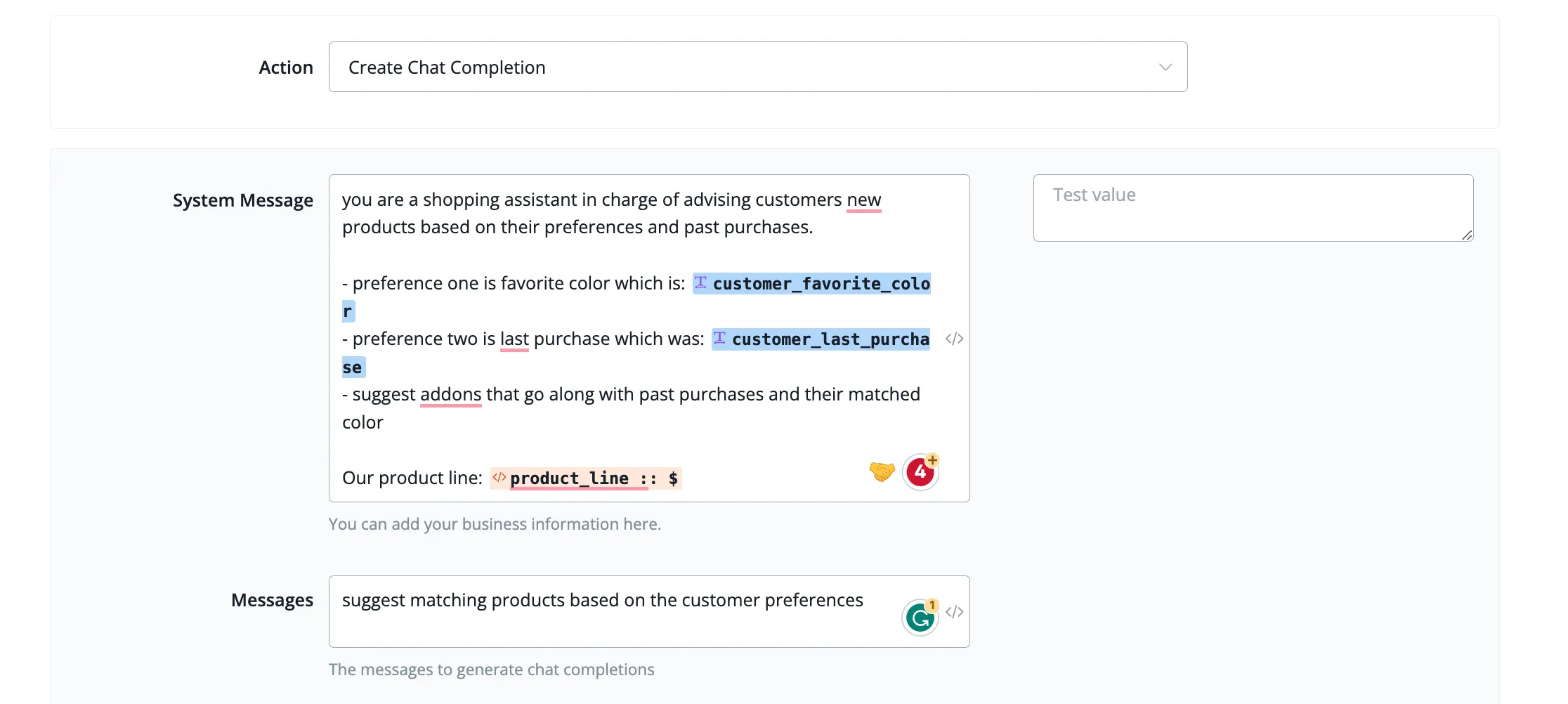
This image from earlier can be customized to also offer such upsells before the customer leaves your webshop and increase your order revenue. On average upselling can provide an average increase of 15-45% on your total order revenue if you make good use of personalization.
However, it is crucial to offer upsell and cross-sell offers that make sense and provide value to the customer.
Just like in the example of McDonald's, an unsuccessful upsell tactic can irritate customers and have a counter-effect.
Therefore, careful consideration should be given to the relevance and usefulness of the offers being presented.
This is where AI chatbots excel. By analyzing customer data and preferences, AI chatbots can make personalized product recommendations in real time.
They can understand customers' pain points, preferences, and past purchasing behavior to tailor-make offers that are highly relevant and valuable to the customer.
Implementing AI chatbots for upselling and cross-selling can lead to increased sales and revenue for eCommerce businesses. These chatbots can engage customers effectively, provide personalized recommendations, and ensure clear objectives are met during customer conversations.
With AI chatbots, businesses can achieve a higher response rate, improve customer experiences, foster loyalty, and encourage long-term commitment.
Furthermore, AI chatbots offer the advantage of 24/7 availability, allowing businesses to provide hyper-personalization and assistance to customers at any time.
This constant availability ensures that upselling and cross-selling opportunities are not missed, even outside of normal business hours.
To implement effective upselling and cross-selling strategies with AI chatbots, businesses can leverage tools such as the UChat chatbot platform or ChatGPT. These tools enable businesses to create conversational marketing experiences, analyze customer interaction history, and deliver relevant product upgrades or add-ons.
Building Customer Loyalty with Hyper-personalized Chatbot Experiences
Building customer loyalty with hyper-personalized chatbot experiences is a crucial strategy in today's competitive market. As discussed in the previous section, hyper-personalization plays a significant role in enhancing customer experience and fostering strong relationships.
By leveraging generative AI, chatbots can deliver personalized recommendations, tailored content, and customized solutions to individual customers.
The level of personalization offered by chatbots creates a more engaging and satisfying experience for customers, ultimately increasing their loyalty to the brand.
When customers feel that a brand understands their unique needs and preferences, they are more likely to remain loyal and continue doing business with that company. Moreover, satisfied customers are more likely to share their positive experiences with others, leading to word-of-mouth referrals and further expanding the customer base.
Companies that have implemented hyper-personalized chatbot experiences have witnessed significant improvements in customer satisfaction and retention rates. By utilizing customer data and AI tools, businesses can gain valuable insights into customer behavior, preferences, and pain points.
This information allows chatbots to engage in effective customer conversations, providing real-time communication and tailor-made product recommendations.
However, it is crucial to ensure that hyper-personalization is done responsibly and ethically, respecting customer privacy and data protection regulations. Companies must be transparent about how customer data is collected, stored, and used, and give customers control over their information.
So make sure you have this properly covered in your terms and conditions as well as your privacy policy. Extremely important if you operate in the EU because of the GDPR.
In a Nutshell
AI chatbots have proven to be a game-changer in customer engagement strategies. By leveraging customer data, businesses can create personalized interactions that enhance customer experiences. Real-time communication and support provided by chatbots ensure that customers receive immediate assistance, leading to higher satisfaction levels.
AI chatbots can also maximize sales opportunities by upselling and providing product recommendations. Lastly, by delivering hyper-personalized experiences, chatbots can build customer loyalty and foster long-term relationships.
As businesses continue to adapt to the digital landscape, incorporating AI chatbots into their customer engagement strategies is essential for staying competitive and providing exceptional customer experiences.
If you want to implement similar strategies be sure to try out UChat today as it just takes a few steps to get started and implement AI into your automation
